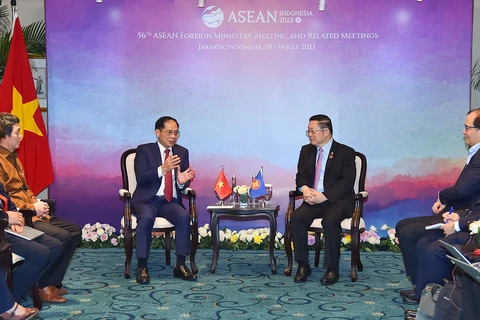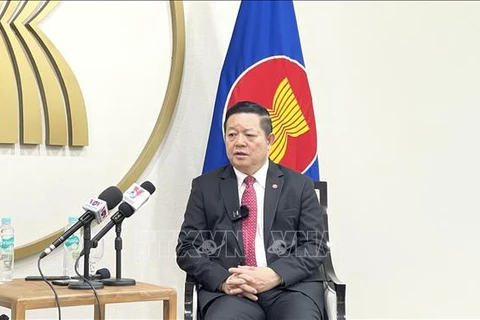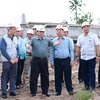Hanoi (VNA) – Prime Minister Pham Minh Chinh on April 23 hosted a reception for ASEAN Secretary-General Kao Kim Hourn who is paying a working trip to Vietnam and attending the ASEAN Future Forum (AFF) 2024 from April 21-24.
PM Chinh thanked Kao for his attendance at the forum, which was held at the initiative of Vietnam, and expressed his hope that the AFF will be a venue where initiatives to bolster regional cooperation will be shared, helping to build an ASEAN community of solidarity, resilience and sustainable development.
Speaking highly of the ASEAN Secretariat and Kao’s contributions to the ASEAN Community, the Vietnamese Government leader stressed that the group has made important achievements after nearly six decades of establishment and development.
PM Chinh thanked Kao for his attendance at the forum, which was held at the initiative of Vietnam, and expressed his hope that the AFF will be a venue where initiatives to bolster regional cooperation will be shared, helping to build an ASEAN community of solidarity, resilience and sustainable development.
Speaking highly of the ASEAN Secretariat and Kao’s contributions to the ASEAN Community, the Vietnamese Government leader stressed that the group has made important achievements after nearly six decades of establishment and development.
The bloc needs to maintain its solidarity, independence, self-reliance and adaptation to the regional and global volatility so as to build a community with fast and sustainable growth and in accordance with the trend of the era, he said.
PM Chinh held that ASEAN should boost dialogue relations with its partners, particularly the world’s powers, in the direction of balance, diversification, multilateralisation, harmonising benefits and sharing risks, and reducing disagreements for an environment of peace, cooperation and development in the region, and for a strong, independent, resilient and adaptive ASEAN.
Amidst complicated developments of the region and the world, PM Chinh laid a stress on the significance of maintaining solidarity, unity and central role of ASEAN in promoting the settlement of regional issues.
Regarding the East Sea issue, he affirmed that ASEAN is adopting a rational approach and maintaining its key role in promoting dialogues, handling disagreements via peaceful measures and in accordance with international law, including the United Nations Convention on the Law of the Sea 1982 (UNCLOS), preventing the escalation of tensions and conflicts, and ensuring peace, security and freedom of navigation and overflight in the region.
Regarding the situation in Myanmar, PM Chinh affirmed that Vietnam and other ASEAN member states always support humanitarian assistance efforts of the bloc and its partners in Myanmar. He expressed his hope that ASEAN will continue to steadfastly implement the Five-Point Consensus (5PC) to support Myanmar.
He said that Vietnam supports Laos as the Chair of ASEAN 2024 and the Special Envoy of the Chair on Myanmar, as well as the ASEAN Secretary-General in promoting the implementation of 5PC, especially in mobilising humanitarian assistance from the international community for the people of Myanmar through the Coordinating Centre for Humanitarian Assistance on Disaster Management (AHA Centre) to help Myanmar overcome this difficult period.
More than ever, ASEAN needs to unite together, promote more innovative and breakthrough approaches to support Myanmar in seeking feasible and sustainable solutions for the benefit of the people of Myanmar, and for peace, security, and stability in the region, the PM stressed.
For his part, Kao said the AFF is an important initiative, reflecting the strategic vision of PM Chinh and Vietnam in promoting the establishment of a dedicated ASEAN forum on the future of the bloc, contributing to the building of a rapid and sustainable development and people-centered ASEAN Community, which can adapt swiftly to geopolitical fluctuations and competition among major countries in the region.
For the building of the ASEAN Community, Kao reaffirmed that this is a common interest and priority of member nations. He noted that partner countries consistently value the relationship with and central role of ASEAN, and are ready to support the group in implementing its key priorities in each pillar of the Community, especially in trade, investment, human resources training, and people-to-people exchanges.
PM Chinh held that ASEAN should boost dialogue relations with its partners, particularly the world’s powers, in the direction of balance, diversification, multilateralisation, harmonising benefits and sharing risks, and reducing disagreements for an environment of peace, cooperation and development in the region, and for a strong, independent, resilient and adaptive ASEAN.
Amidst complicated developments of the region and the world, PM Chinh laid a stress on the significance of maintaining solidarity, unity and central role of ASEAN in promoting the settlement of regional issues.
Regarding the East Sea issue, he affirmed that ASEAN is adopting a rational approach and maintaining its key role in promoting dialogues, handling disagreements via peaceful measures and in accordance with international law, including the United Nations Convention on the Law of the Sea 1982 (UNCLOS), preventing the escalation of tensions and conflicts, and ensuring peace, security and freedom of navigation and overflight in the region.
Regarding the situation in Myanmar, PM Chinh affirmed that Vietnam and other ASEAN member states always support humanitarian assistance efforts of the bloc and its partners in Myanmar. He expressed his hope that ASEAN will continue to steadfastly implement the Five-Point Consensus (5PC) to support Myanmar.
He said that Vietnam supports Laos as the Chair of ASEAN 2024 and the Special Envoy of the Chair on Myanmar, as well as the ASEAN Secretary-General in promoting the implementation of 5PC, especially in mobilising humanitarian assistance from the international community for the people of Myanmar through the Coordinating Centre for Humanitarian Assistance on Disaster Management (AHA Centre) to help Myanmar overcome this difficult period.
More than ever, ASEAN needs to unite together, promote more innovative and breakthrough approaches to support Myanmar in seeking feasible and sustainable solutions for the benefit of the people of Myanmar, and for peace, security, and stability in the region, the PM stressed.
For his part, Kao said the AFF is an important initiative, reflecting the strategic vision of PM Chinh and Vietnam in promoting the establishment of a dedicated ASEAN forum on the future of the bloc, contributing to the building of a rapid and sustainable development and people-centered ASEAN Community, which can adapt swiftly to geopolitical fluctuations and competition among major countries in the region.
For the building of the ASEAN Community, Kao reaffirmed that this is a common interest and priority of member nations. He noted that partner countries consistently value the relationship with and central role of ASEAN, and are ready to support the group in implementing its key priorities in each pillar of the Community, especially in trade, investment, human resources training, and people-to-people exchanges.
Regarding the Myanmar situation, Kao said ASEAN needs to prompt relevant parties in Myanmar to increase meetings and dialogues for the interest of the Myanmar people and for peace and stability in the region.
For the East Sea issue, he welcomed and praised Vietnam's strategic thinking and appropriate approach, expressing his hope that all parties will promote negotiations towards the completion of a practical, effective and suitable Code of Conduct in the East Sea (COC) based on international law, including the United Nations Convention on the Law of the Sea 1982, and for the benefit of ASEAN.
On this occasion, the two leaders exchanged views on other ASEAN cooperation issues such as promoting Timor Leste's efforts to become a full member of the group and enhancing the capacity of the ASEAN Secretariat by recruiting competent officials from the bloc’s member countries, including Vietnam.
On this occasion, the two leaders exchanged views on other ASEAN cooperation issues such as promoting Timor Leste's efforts to become a full member of the group and enhancing the capacity of the ASEAN Secretariat by recruiting competent officials from the bloc’s member countries, including Vietnam.
The Association of Southeast Asian Nations (ASEAN) groups Brunei, Cambodia, Indonesia, Laos, Malaysia, Myanmar, the Philippines, Singapore, Thailand and Vietnam./.
VNA























